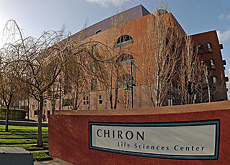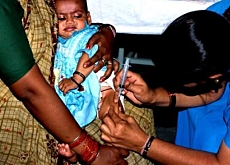Chiron shareholders approve Novartis deal

Swiss pharmaceuticals giant Novartis has acquired the remaining stake in the world's fifth-biggest vaccine maker, Chiron, for $48 (SFr60.8) a share, or $5.4 billion.
California-based Chiron said on Wednesday its shareholders had approved the deal with the Basel-based company, which already owns 44 per cent of Chiron’s shares.
Chiron said more than 85 per cent of its outstanding shares were cast in favour of the agreement, which it expects to close on Thursday as all necessary regulatory approvals had previously been obtained.
The vote followed strong opposition from some of Chiron’s largest shareholders to Novartis’s previous offer of $45 a share, or $5.1 billion.
When Novartis sweetened its bid to $48 a share at the beginning of this month, CAM North America and ValueAct, Chiron’s second- and third-largest shareholders respectively with a combined 17 per cent Chiron stake, said they would vote in favour of the transaction.
Rejection
Novartis had initially bid $40 a share in September 2005 when Chiron was crippled by plunging profits and surging expenses resulting from a vaccine debacle.
The company had been plagued by production problems at a plant in Britain, which limited its ability to supply flu vaccines to the United States.
Similar problems at a Chiron vaccine plant in Germany last year also forced the company to scrap plans to supply the European flu shot market.
While the Chiron board of directors rejected the original Novartis bid, it agreed to the $45-a-share offer, which prompted a flurry of shareholder lawsuits.
Chiron said earlier this month it had reached an agreement in principle to settle those lawsuits.
Vaccine plan
When Novartis made its $45-a-share bid last October, it said the acquisition would give it entry into the global vaccines business, which is expected to experience accelerated growth over the next five years.
“Our plan is to turn around the Chiron vaccines business, which will require investments in R&D [research and development] and manufacturing to increase quality and capacity, so that we can better meet customer demand and address public health needs,” said Novartis CEO Daniel Vasella at the time.
Chiron’s product portfolio also includes vaccines for disease such as rabies, polio, measles and rubella.
Novartis, which employs around 91,700 people, achieved net sales of $28.2 billion in 2004.
It has already splashed out $8 billion this year on two generic drugs makers and a further $660 million on Bristol-Myers Squibb’s portfolio of non-prescription drugs.
swissinfo with agencies
Novartis was formed in 1996 through the merger of Ciba-Geigy and Sandoz.
The company became the world’s biggest producer of generic drugs in 2005 when it bought German company Hexal with its US strategic partner Eon Labs.
Novartis is the second-largest manufacturer of over-the-counter (OTC) drugs in Europe. It strengthened the OTC business last year by buying a portfolio of OTC products from US company Bristol-Myers Squibb.
The pharmaceutical giant plans to launch a fourth division, vaccines, now that its takeover of California-based Chiron has been approved.
Chiron was founded in 1981 and has its headquarters in Emeryville (California).
It is the world’s fifth-largest producer of vaccines.
Total sales for 2004: $1.7 billion.
The company employs around 5,400 people worldwide.
Novartis turned in a record profit of SFr7.8 billion ($6.1 billion) with net sales of SFr41.7 billion in 2005.
In 2005 Novartis was rated as the fourth-largest pharmaceutical in the world in terms of total pharmaceutical sales (SFr27.08 billion) with an estimated 5.05% share of the total market.

In compliance with the JTI standards
More: SWI swissinfo.ch certified by the Journalism Trust Initiative











You can find an overview of ongoing debates with our journalists here . Please join us!
If you want to start a conversation about a topic raised in this article or want to report factual errors, email us at english@swissinfo.ch.